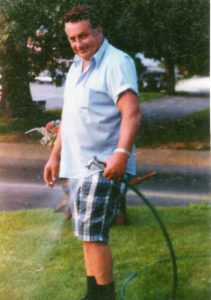By Victor Greto
A cigar is like a personal weapon. A sword wielded against company, prying eyes, communication. It’s also a smoky reverie of thought, curling, mingling, silkily meshing, inextricable, making mysterious the face behind the smoke.
It’s me.
I drove down to Rehoboth Beach in late March to conduct a writing workshop at a conference. Before I did anything – before I met the organizer, my colleagues, the wanna-be writers – I took a walk along the beach and smoked a cigar.
It was the beginning of spring, and I hadn’t been regularly smoking cigars because of the cold. Even now, it was chilly for a 45-minute walk along a breezy bit of beach. But the sound of the ocean, the scent of smoke and the feel of the rolled tobacco on my lips worked, as it always had.
When I first began smoking cigars, nearly a decade before, I told a girl I took out to lunch how much I had begun to enjoy it. Inexplicably, she blurted, “What do you want, your face to fall off or something?”
Actually, I think it has changed my face.
Not for better or for worse; just changed it, the way age has, the way thinking has, the way being in love and being alone has.
“At fifty, everyone has the face he deserves,” George Orwell said, four years before he would have turned that half-century mark. He only made it to forty-seven, dying of tuberculosis. I like the quote, because I think Orwell meant not the construction of the face itself, but everything else about it, the results that a lifetime of decisions might suggest to the person observing it.
My old man didn’t die until he was sixty-eight. But in the 5 x 7 photo my brother Perry gave me recently, his face, at about the age I am now, nearing fifty, is, unlike mine, broad, open, sly, somehow charmed with sorrow. Perry gave me the photo, a larger version of one he carries around in his wallet, after driving by one evening and seeing me in front of our childhood home watering the flowers and smoking a cigarette.

In the photo, taken during the summer of 1980 or 1981, my old man is watering unseen flowers toward the front of our family home, near the same spot I had been watering.
My father is wearing plaid shorts, a button-down, tail-out blue shirt, black socks and slippers, a burning cigarette in his right hand, a silver watch clamped to his left wrist; his left hand squeezes the handle of a hose spraying water just past his feet. A pack of cigarettes (Benson & Hedges Menthols) can be seen outlined in his breast pocket. He’s smiling the way I remember: with his head turned slightly to the right, a pudgy, self-conscious grimace and squinched eyes ready to wink. His head of tightly curled hair, colored black, frays gray at the edges.
Unknown to any of us, of course, the summer during which this picture was most likely taken marked the beginning of my old man’s descent into increasingly shorter spans of sanity and longer spaces of manic depression and paranoid schizophrenia, both of which he had been diagnosed with decades before. Every few years he became uncontrollable, and each of my five brothers in succession became responsible for getting him to commit himself into a hospital. I had taken the lead in caring for him during my high school years and would leave home, mostly because of my father’s mental illness, as soon as I graduated.
The summer I left, he went crazy again. I remember hearing my brother Jimmy tell me this over the phone, while I stood by the kitchen table in a Colorado apartment. I felt relief. I knew I’d never move back home again. For more than two decades, I never even considered it– until dad died in January 2000 from kidney failure, brought on by the medication he had been taking all of his life.
Curiously enough, I’d flown in to visit mom and dad just one day before he died. I knew nothing of the seriousness of his final illness. I knew he had been sick again – “sick” in the mentally ill sense, a word that had become the recurring euphemism of my youth.
But I didn’t know his kidneys were breaking down.
I flew home on a spur of the moment, imagining a mid-January, week-long visit of hanging out with mom and dad during the day, and bar-smoky nights with my brothers.
We all are cigar smokers – at least my brothers close to me in age, Perry, four years older, and Jimmy, two years younger.
None of us had been smokers like my old man and his generation had. His thing was cigarettes, one after another. Ours was cigars, intermittently.
The night before my old man died, before I had a chance to smoke a cigar, I stood in the kitchen with my mother – soon after she explained to me that dad was in the hospital recovering from the latest illness – when the phone rang. I picked it up and a mechanical voice asked for my mother.
She listened into the receiver, handed it back to me, and said, “I’ve been waiting for this call.” She paused. “Your father’s going to die.”
By the time we got to the hospital the next morning, It had started snowing and the halls were as bright and white as the snow already plowed against the sidewalks. You could see everything in antiseptic detail.
My father lay crumpled on the hospital bed, gasping.
Because the false teeth he’d been wearing for nearly twenty years had been removed, his mouth pursed sunken and the prominent outline of his skull quivered. His hair, a stark white for decades, had turned ashen, nearly transparent, sweat-moussed toward a point; his facial skin, a gummy charcoal, pocked with a gray five-o-clock shadow. His large chest heaved with each breath, air whistling sharply through his lungs, exhaling and inhaling abruptly through his mouth. Every time he breathed, it was as if he had been holding his breath for minutes at a time, or had just surfaced after swimming hard.
Jimmy was already inside. He helped me ensconce mom in a chair next to dad. She held his hand. I walked over to the door of the room and placed my forehead against the jamb. With my left eye I saw dad gasping on the bed, my mother and Jimmy sitting and looking at him; with my right eye, I saw the stark white of the hospital corridor.
Like the breeze from the spit of beach I now walked, the jamb, cold against my head, felt good.
And just like now, the last thing I wanted touching me was human flesh, even my dad’s, whose flesh would soon be as cold as the jamb.
Every time I smoke a cigar, I’m trying to think of each of the twenty years I’d been away from home, like calendar pages torn away. It’s all time lost now. While I trudged through a wasted marriage and petty, foolish relationships, my dad and mom got two decades older.
I now remember my old man as he was in that picture Perry gave me years later. That smile, wizened, softened and channeled by drugs, madness and cigarette smoke.
In the hospital, I heard the echo of my father’s breathing, like waves whispering to the shore. Frightened, I walked into the room. I bowed quietly to his face, kissed his forehead lightly, and said, “I’m sorry, dad.” I did not touch him. I just walked out of the room.
Now, I look at my cigar and want to cry because it’s nearly done.
When my cigar goes out, when there’s nothing left for me to light, when the flame of the lighter gets too close to my fingers, I give up on it.
The thing about cigars and beaches and sand and memories and faces is that they all live on the edge, and they’re all sooner or later replaced.
One day, I’ll be unable to light a cigar, or walk a beach in March, or perhaps even remember my father’s face.
When that happens, I’ll finally be at peace.
© 2012 Victor Greto
